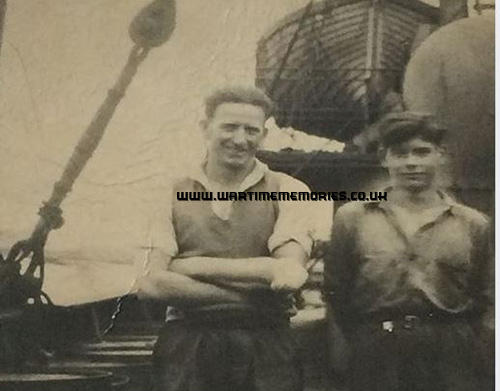Sea. Maurice "Ginger" Archer
Merchant Navy SS Wendover
from:South Shields
My father, Maurice Archer (or Ginger as he was nicknamed, for his red hair) was 17 when he sailed out of Liverpool on 21st June 1940. His Merchant Navy ship, the SS Wendover, was bound for Bordeaux carrying coal on passage. France had just fallen to Germany, so orders were changed and the ship was diverted to Rio de Janeiro. On 12th July, my father celebrated his 18th birthday. On the 16th July, my father’s ship was captured at sea by a German raider. During the capture, a burly German officer turned to my father and told him "The war is over for you, son". But this was just the start of 4.5 years in captivity and in concentration camps where my father witnessed death, hunger, cold, and disease. He now tells his story:
"On the 16th July 1940, I was on 4-8 watch when according to the 8-12 watch a ship flying Yugoslav colours had opened fire from the port quarter, killing the radio operator and setting fire to the bridge. The ship turned out to be a disguised German raider. During the one-way exchange of fire (the raider kept of range), Able Seaman George Smith was seriously injured and the third engineer, Mr. Gibson, and the steward, Mr. Gernardt, were killed. George Smith died later of his injuries. After four months aboard the raider, we were transferred to a prison ship. Conditions on the raider were passable, but the prison ship was deplorable.
We landed in Bordeaux a few weeks later and were taken to the prison camp Caserne Colonial Bordeaux. This camp bordered on primitive in every sense of the word. Our first night there we had doors for beds. We weren't sorry to leave there in a cattle truck three days later, when we were taken to Drancy Prison in Paris. The less said about our stay at Drancy the better. The only good thing I remember about Drancy was the kindness of the French women who had nothing themselves, but nevertheless threw loaves of bread to us past the guards.
Most of the prisoners, including myself, were sent from Drancy to concentration camps. After five days of normal transportation (i.e., in cattle trucks), we arrived at Bremervorde in northwestern Germany near Bremen, and were then marched several miles to Stalag X-B in Sandbostel, where we were greeted by the stink of death. I was held in Stalag X-B for two years, and I will never forget that smell – it lingered constantly. Many thousands of POWs died there. In early 1945, in the face of advancing British forces, the camp was evacuated, and we were marched to Marlag und Milag Nord, from where I was later repatriated.
There have been times when I've thought about the few months of kindness and friendliness shown by Frau Wilmbrock and her family in the village of Kirch, where I and fellow Stalag X-B prisoner Jock Reid worked their farm.
Little did I know, but back home I was considered missing and presumed dead. My name was and still is on the wall of remembrance in the Mission to Seaman in South Shields."
